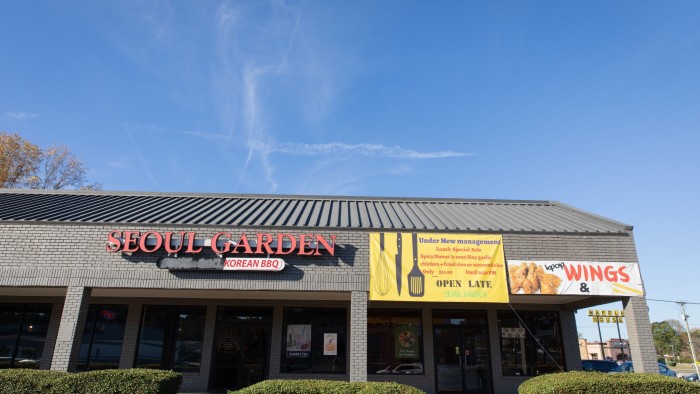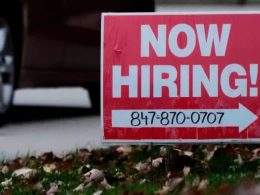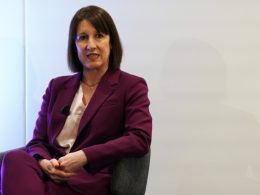Good morning and welcome back to Energy Source, coming to you from New York.
Oil markets held largely steady on Monday amid increased uncertainty in the Middle East from the toppling of the regime of Bashar al-Assad. Brent crude, the global benchmark, closed 1.4 per cent higher at $72.14 per barrel.
But we turn our focus to a different topic in today’s newsletter. Korean companies are investing billions of dollars in US factories to manufacture clean technologies following the passage of President Joe Biden’s landmark climate law, the Inflation Reduction Act.
The unintended side-effect: emerging Koreatowns in rural and industrial parts of America as Korean immigrants and entrepreneurs chase the clean energy economy for opportunity and community. More on that below.
Thanks for reading,
Amanda
The new American Koreatowns
Growing up in Korea, Grace Jung was fascinated by American culture, starring in productions of the musical, Grease, and getting a degree in English.
An English instructor in Suwon, South Korea, Jung teaches women she has dubbed “Samsung wives”, spouses of workers at the Korean conglomerate dispatched to work at US facilities.
Now, she’s looking to move to the US to set up a school in Kokomo, Indiana, to teach the influx of Koreans working at Starplus Energy, a Samsung joint venture with Stellantis, where they are building a $6.3bn electric vehicle battery factory in the industrial town.
“I think I’m crazy,” said Jung. “I will be going there to create my new business and to challenge myself . . . Some people really disagree with my challenge . . . because in Korea, my life is very settled down.”
Jung is not alone. Kokomo has seen a wave of Korean nationals and businesses arrive since Starplus’ investment in 2022, including seven Korean restaurants (up from zero), a Korean church and apartment rentals to serve Korean workers who often arrive on fixed contracts that range from several months to a few years. City authorities believe about 800 Korean nationals — roughly the size of the city’s current Asian population — have come to help with the factory’s construction and have launched several training sessions to teach locals about Korean customs and culture.
“We want to show we really appreciate them being here, and we thought the best way to do that was to build a very nice restaurant,” said Scott Pitcher, a former Chrysler worker turned real estate developer who is dedicated to preserving Kokomo’s downtown.
Pitcher has transformed former newspaper buildings and churches into housing for Korean workers and recently launched Sute, an upscale Korean restaurant, with Sean Park, who moved to Kokomo last year from Seoul with his family. The plans are part of their broader vision of “Kokotown”, a Korean district in the city’s downtown.

The transformation taking place in Kokomo is happening across the country as Korean companies, including Hyundai, Kia, LG and SK Group inject record amounts of capital into the US economy following the 2022 enactment of the Inflation Reduction Act and the Chips and Science Act. The Biden administration’s landmark industrial policies offer lucrative subsidies for manufacturers to build factories in the US to reduce the country’s reliance on Chinese supply chains.
In Savannah, Georgia, the city estimates hundreds of Korean workers have moved there to serve Hyundai’s $7.6bn EV factory, the largest economic development project in the state’s history. A Korean supermarket opened over the summer, and a couple of Korean churches and restaurants have also arrived. Meanwhile in Taylor, Texas, the city is in talks with several Korean restaurants looking to meet the expected demand from a Samsung semiconductor plant currently under construction.
“We didn’t expect our food box business to grow so rapidly,” said Robert Kim, who opened Mr K BBQ, a Korean restaurant, in Commerce, Georgia after SK On announced it would build a battery plant. After hearing about Starplus’ investment, he opened a location in Kokomo, where he delivers 800 meal boxes a day to Korean employees and makes 20-hour road trips every week to deliver groceries.
The Starplus investment is coming at an opportune time for Kokomo. The industrial city, the birthplace of the automobile, was hit hard by globalisation and the financial crisis. At the turn of the century, Kokomo boasted one of the top average salaries in the nation and manufacturing made up half of its workforce. By 2009, its major employers GM, Chrysler and Delphi had all declared bankruptcy, unemployment surpassed 20 per cent and Forbes had declared the city one of America’s fastest-dying towns.
“We lost some really good members because they had to go other places for jobs,” said Joyce Harris, lead pastor at First Evangelical Presbyterian Church in Kokomo, which in October launched Glory Church, a Korean worship service led by Joshua Ryu. Ryu moved to Kokomo in August from Fullerton, California after his two sons, Daniel and Samuel, got jobs at Starplus.
Still, there are growing pains. Rent has gone up 23 per cent in the past year, forcing some residents to move out of the city. Kokomo is in the process of developing six housing projects, with 1,300 units expected to become available in the next 18 months.
There are also concerns over the strength of the EV market and what the lack of union status at the Starplus plant will mean for the strength of organised labour at the other plants in the area.
“There are so many buildings sitting empty,” said Jackie, a bartender at Half Moon, a local bar frequented by unionised Stellantis workers. Earlier this year, car supplier BorgWarner closed its factory in Kokomo, laying off dozens of workers. “I just don’t know if this battery plant is going to sustain itself.”


The biggest concern is Donald Trump. The incoming president is a loud critic of EVs and has vowed to undo incentives in the IRA and Chips Act. Still, the vast majority of Kokomo residents voted in favour of the president-elect.
“If you get Trump into office, he will try to get as much manufacturing as possible,” Tom Harrold, a real estate agent, told Energy Source on the eve of the election. “My life was better under Trump. That’s all I know,” said a 25-year-old man who refused to give his full name, as the results trickled in the following night.
Others are not so convinced.
“We got a lot of dumb people in this city,” said Bill Reed, a casting plant worker. “You’re basically getting a government subsidised wage, and you don’t make a connection that Biden was behind all that.
“You’re bitching about his policies, yet you’re working because of his policies.”
(Amanda Chu)
Power Points
Energy Source is written and edited by Jamie Smyth, Myles McCormick, Amanda Chu, Tom Wilson and Malcolm Moore, with support from the FT’s global team of reporters. Reach us at energy.source@ft.com and follow us on X at @FTEnergy. Catch up on past editions of the newsletter here.
Recommended newsletters for you
Moral Money — Our unmissable newsletter on socially responsible business, sustainable finance and more. Sign up here
The Climate Graphic: Explained — Understanding the most important climate data of the week. Sign up here
Source link










